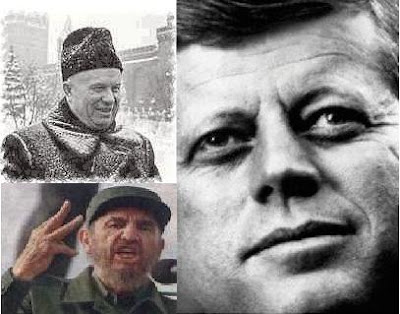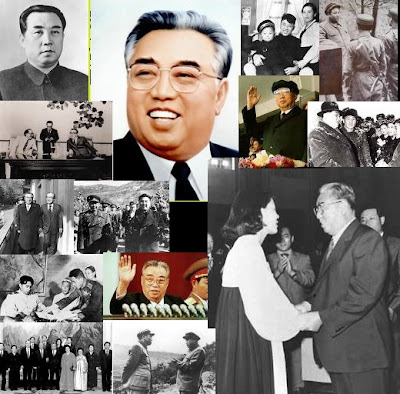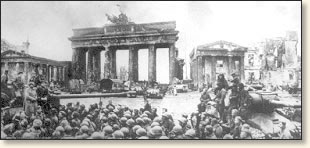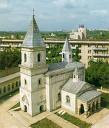~~ Pinochet ~~
Though General Pinochet became a devil symbol of the international left, he was a far more complex figure and cannot be understood apart from the global Cold War conflict of which he and his country were a part. Pinochet's legacy is a paradox--a long string of them.
He took power in a coup in 1973, but ultimately he created an environment where democratic institutions would prevail. He is responsible for the death and torture that occurred on his watch, but had Salvador Allende succeeded in turning Chile into another Cuba, many more might have died.
Why did the United States, which helped Pinochet seize power from Salvador Allende, support the violent dictator for nearly two decades? Scholars answering these questions have usually focused on the threat posed by Allende, the first elected Marxist head of state, to Chilean and US business interests and to the cold war foreign policy of the United States. But recently declassified documents, along with the reissue of Patricia Politzer's Fear in Chile: Lives Under Pinochet, suggest that the Chilean counterrevolution, however much shaped by immediate economic and political causes, was infused with a much older, more revanchist political spirit, one stretching as far back as the French Revolution.
~~ Allende ~~
Salvador Allende was born in Valparaiso, Chile, in 1903. As a medical student he became involved in radical politics and he was arrested several times while at university.
In 1933 Allende helped to found the Chilean Socialist Party, a Marxist organization that was opposed to the Soviet Union influenced Communist Party.
Allende was elected to the Chamber of Deputies in 1937 and served in the government of Pedro Aguirre Cerda as Minister of Health (1939-41). He was also senator between 1945 and 1970.
Allende's attempts to build a socialist society was opposed by business interests. Later, Henry Kissinger admitted that in September 1970, President Richard Nixon ordered him to organize a coup against Allende's government. A CIA document written just after Allende was elected said: "It is firm and continuing policy that Allende be overthrown by a coup" and "it is imperative that these actions be implemented clandestinely and securely so that the USG (United States government) and American hand be well hidden."
~~ Nixon ~~
lunes, 1 de junio de 2009
~~ Ho Chi Minh/Domino Theory ~~

~~Ho Chi Minh~~
A man of humble background, Ho Chi Minh became one of the key figures in establishing communist rule in Vietnam and became notorious throughout the world as one of Communist’s strongest leaders. He organized the Communist revolution in Vietnam and can be given much of the credit for reuniting Vietnam under communist rule.
Ho Chi Minh was born Nguyen Tat Thanh in 1890 in the village of Kim Lien in Annam which is located in central Vietnam. His father, Nguyen Sinh Huy was a nationalist and raised his children to hate the French who controlled Vietnam. Ho was the youngest of three children all of which did their part in to overtake the French. His sister obtained a job in the French army and used her position to steal weapons for their eventual overthrow but she was caught and sentenced to life in prison. Though his father refused to learn French, he sent Ho to the National Academy school in Hue to learn be educated by the French in hopes that Ho could obtain knowledge that could be used against the French. When Ho finished school he became a teacher at a private school. He became a sailor and in traveling the world he learned that other countries were just as oppressed ads the French as Vietnam.
Ho Chi Minh was born Nguyen Tat Thanh in 1890 in the village of Kim Lien in Annam which is located in central Vietnam. His father, Nguyen Sinh Huy was a nationalist and raised his children to hate the French who controlled Vietnam. Ho was the youngest of three children all of which did their part in to overtake the French. His sister obtained a job in the French army and used her position to steal weapons for their eventual overthrow but she was caught and sentenced to life in prison. Though his father refused to learn French, he sent Ho to the National Academy school in Hue to learn be educated by the French in hopes that Ho could obtain knowledge that could be used against the French. When Ho finished school he became a teacher at a private school. He became a sailor and in traveling the world he learned that other countries were just as oppressed ads the French as Vietnam.
~~Domino Theory ~~
The Cold War “containment” notion was born of the Domino Theory, which held that if one country fell under communist influence or control, its neighboring countries would soon follow. Containment was the cornerstone of the Truman Doctrine as defined by a Truman speech on March 12, 1947. The Truman Doctrine, the Marshall Plan, NATO and the United Nations then became the foundation of American foreign policy through the Reagan administration and beyond, for about 50 years.
American policy toward the Soviet Union did not change immediately. The Truman administration, operating on the basis of JCS 1067* and the Potsdam agreements, was determined to get along with the Soviets. Those agreements made clear that their principal mission was the unification of Germany, and therefore, cooperation with the Soviets seemed essential. Germany would be administered as a single economic unit by the Allied Control Council under General Lucius D. Clay, but Stalin sealed all land access to East Germany, and West Berlin (in East Germany) became isolated. Clay said to his staff, "We have to make it work. If the four nations cannot work together in Berlin, how can we get together in the United Nations to secure the peace of the world?" Obviously, there had to be some give and take; within the Allied Control Council, that was going to be the American policy.
American policy toward the Soviet Union did not change immediately. The Truman administration, operating on the basis of JCS 1067* and the Potsdam agreements, was determined to get along with the Soviets. Those agreements made clear that their principal mission was the unification of Germany, and therefore, cooperation with the Soviets seemed essential. Germany would be administered as a single economic unit by the Allied Control Council under General Lucius D. Clay, but Stalin sealed all land access to East Germany, and West Berlin (in East Germany) became isolated. Clay said to his staff, "We have to make it work. If the four nations cannot work together in Berlin, how can we get together in the United Nations to secure the peace of the world?" Obviously, there had to be some give and take; within the Allied Control Council, that was going to be the American policy.
~~ Kennedy,Krushcev, and Castro ~~

~~ Kennedy ~~
John F. Kennedy is considered as one of the greatest Presidents of United States who had only one dream: to bring his nation on the front seat as a leader of the world and he tried his heart & soul to make his dream come true. Below are some facts and information on the life and history of John F. Kennedy.
John Fitzgerald. Kennedy was born on May 29 1917 in Brookline, Massachusetts to a highly successful businessman Joseph Patrick Kennedy of Irish origin and Rose Fitzgerald. He was second eldest son of nine children to Joseph Patrick Kennedy among four boys and five girls, and was named Jack, further he was named John Fitzgerald in honor to John Francis Fitzgerald (his maternal grandfather). He was a grandson to Patrick Kennedy who had shifted from Ireland and settled to Massachusetts in 1849 to explore new possibilities of business. His grandfathers Patrick Joseph Kennedy and John Francis Fitzgerald were successful and very powerful politicians in Boston.
He was an active cold warrior his first Congressional campaign boasted of taking on the anti-Cold War faction of the Democratic Party led by Henry Wallace, and as a congressman he aligned himself with those who said the Truman Administration wasn't being tough enough.
Even while running for President in 1960, JFK appealed to the "tough on the Soviets" issue by consistently hammering at Eisenhower for America's supposed lack of leadership, and America "falling behind the Soviets."
JFK, to be sure, did make efforts to reduce direct tensions with the USSR following the Cuban Missile Crisis.
Even while running for President in 1960, JFK appealed to the "tough on the Soviets" issue by consistently hammering at Eisenhower for America's supposed lack of leadership, and America "falling behind the Soviets."
JFK, to be sure, did make efforts to reduce direct tensions with the USSR following the Cuban Missile Crisis.
~~Krushcev~~
Born a Ukrainian peasant, Nikita Sergeyevich Khrushchev joined the Communist party in 1918 and in four decades rose through the ranks to become the leader of all the Soviet Union. Khrushchev first became a member of the party's central committee in 1934. He had a close connection to Soviet leader Joseph Stalin, and after Stalin's death in 1953 Khrushchev emerged as the new leader. He began to reform Stalin's most brutal excesses, and when he denounced some crimes of Stalin in 1956 it was regarded as a stunning development. Khrushchev also attempted to ease relations with the United States; in 1959 he toured the U.S. and met with President Dwight Eisenhower. When a U.S. spy plane piloted by Gary Powers was shot down over Russia in 1960, Khrushchev grew more belligerent, and he grabbed the attention of the world by pounding his shoe on a conference table at the United Nations that fall. Khrushchev, the U2 incident, and the Cold War all became major issues in the 1960 U.S. presidential contest between Vice President Richard Nixon and John Kennedy, which was won by Kennedy. Two years later Khrushchev was forced to back down to Kennedy over the placement of Soviet missiles in Cuba, in what became known as the Cuban missile crisis of 1962. Further domestic and foreign relations disasters weakened Khrushchev's power, and in 1964 he was replaced as Soviet leader by Leonid Brezhnev.
~~Castro~~
He is the former Head of State of Cuba for nearly 50 years, and a leader of the Cuban Revolution. Fidel Castro, as he is widely known, was the Prime Minister of Cuba from February 1959 to December 1976 and then President of the Council of State of Cuba until his resignation from the office in February 2008.
He was born to a rich family and acquired a law degree. During studies at Havana University, he started a political career and was a recognized in politics. His political life continued with nationalist critiques of Fulgencio Batista, and of United States political and corporate influence in Cuba.
The Soviet Union worked quickly and secretly to build missile installations in Cuba. On October 16, President John Kennedy was shown reconnaissance photographs of Soviet missile installations under construction in Cuba. After seven days of guarded and intense debate in the United States administration, during which Soviet diplomats denied that installations for offensive missiles were being built in Cuba, President Kennedy, in a televised address on October 22, announced the discovery of the installations and proclaimed that any nuclear missile attack from Cuba would be regarded as an attack by the Soviet Union and would be responded to accordingly. He also imposed a naval quarantine on Cuba to prevent further Soviet shipments of offensive military weapons from arriving there.
Further negotiations were held to implement the October 28 agreement, including a United States demand that Soviet light bombers also be removed from Cuba, and to specify the exact form and conditions of United States assurances not to invade Cuba.
He was born to a rich family and acquired a law degree. During studies at Havana University, he started a political career and was a recognized in politics. His political life continued with nationalist critiques of Fulgencio Batista, and of United States political and corporate influence in Cuba.
The Soviet Union worked quickly and secretly to build missile installations in Cuba. On October 16, President John Kennedy was shown reconnaissance photographs of Soviet missile installations under construction in Cuba. After seven days of guarded and intense debate in the United States administration, during which Soviet diplomats denied that installations for offensive missiles were being built in Cuba, President Kennedy, in a televised address on October 22, announced the discovery of the installations and proclaimed that any nuclear missile attack from Cuba would be regarded as an attack by the Soviet Union and would be responded to accordingly. He also imposed a naval quarantine on Cuba to prevent further Soviet shipments of offensive military weapons from arriving there.
Further negotiations were held to implement the October 28 agreement, including a United States demand that Soviet light bombers also be removed from Cuba, and to specify the exact form and conditions of United States assurances not to invade Cuba.
sábado, 16 de mayo de 2009
ºº Jacobo Arbenz Guzmàn ºº Carlos Castillo Armas ºº CIA ºº

ºº Arbenz ºº
Born in Quetzaltenango, Guatemala on September 14th 1913.
Arbenz joined the Army and in 1935 graduated as a sub-lieutenant. He joined the Guatemalan Military Academy in 1937 and became a teacher os history and science.
He became a secret opponent of Guatemalan dictator, Jorge Ubico.
Apalled by the actions of Ponce, Arbenz and a fellow junior officer, Major Francisco Arana, organized a military Rebellion. They were quickly joined by other officers. Ponce and Ubico were forced to abandon the country and Arbenz and Arana created a provisional Junta with businessman Jorgue Toriello, and promise free and democratic elections.Arbenz and Arana introduced a new constitution.
ºº Castillo Armas ºº
Colonel Carlos Castillo Armas is elected president of the Junta that overthrew the administration of Guatemalan president Jacobo Arbenz in June 1954. The elction of Armas was teh culmination of U.S efforts to remove Arbenz and save Guatemala from what American officials believed to be an attempt by the international Communism to gain a foothold in the Western Hemisphere.
°° Relation Between Armas, Arbenz and the CIA °°
Arbenz was elected president of Guatemala in 1950. the first CIA effort to overthrow the Guatemalan president, a collaboration with Nicaraguan dictator Anastacio Somoza to support Carlos Castillo,and codenamed Operation PBFORTUNE--was authorized by President Truman in 1952.
Up until the day Arbenz resigned on June 27, 1954, "the option of assassination was still being considered." While the power of the CIA's psychological-war, codenamed "Operation Sherwood," against Arbenz rendered that option unnecessary, the last stage of PBSUCCESS called for "roll-up of Communists and collaborators." Although Arbenz and his top aides were able to flee the country, after the CIA installed Castillo Armas in power, hundreds of Guatemalans were rounded up and killed.
ºº Kim IL Sung ºº

Born on April 15,1912 in Mangyongdae, Northern Korea.
On 1930's Kim emerges as a significant resistance leader, during this time, commanding the 6th division, 2nd Army,1st rout Army of the Northeast Anty- Japanese United Army. The japanese consider him to be so effective and dangerous. They formed a special unit to track him down.
On 1941 Kim is by now the only surviving leader of the Anti-Japanese United Army operating in Manchura. KIm is given command of the 1st Battalion of the brigade and his men are trained in espionage, radio communications and sabotage. Kim and his men will worke with the Soviets until the end of the war, by with time Kim has reached the rank of captain.
On August 28, 1946 the KWP is formally inagurated under the leadership of Kim Tubong and Kim Il Sung. Formed through a merger of the Communist Party of North Korea and the new Democratic Party of korea, the KWP begins to introduce a number of reforms to the North, including an 8 hour working day, equality of the sexes and suppression of religion.
In the Korean War were about three million killed. Between 600,000 and millions North Koreans needlessly starved to death due to the economic legacy of Kim's regime.
ºº The Korean War ºº
 June 1950- July 1953
June 1950- July 1953On June 25 the Cold War suddenly turned hot. Withina few days, NorthKorea's invasion of South Korea brought about a United Nation's "police action" against the agressors. That immediately prduced heavy military and a naval involvement by the United States. Nobody expected that the conflict would continue for more than 3 years. Thoughout the summer ps 1950, the United Nation's states scramble to contain North Korea's fast- moving army, assemble the forces necessary to defeat it and simultaneously begin to respond to what was seen as a global military challenge from the Communist world. The end of World War II, just 5 years earlier had left a vast potential for recovery U.S material reserves. The organized Reserve forces included tens of thousands of trained people, whose WWII experiencesremained reasonably fresh and relevant. Finally on July 27, 1953 with a new regime in the USSR and the blunting of a final Communist offensive, negotiations conclude and the fight ended. However the Cold War, considerably warmed up by the Korean experience, would maintain its costly existance for nearly 4 more decades.
http://www.history.navy.mil/photos/events/kowar/kowar.htm
viernes, 15 de mayo de 2009
ºº Mao Tse Tung ºº

He was Born on december 26, 1893 in Shao-shan. he founded the People's Republic of China.
When the Chinese Communist Party was organized in Shangai in 1921, Mao was a founding member and leader os the Hunan branch. At this stage the party formed a United front with the Kuomintang, the party of the Republican flowers of Sun Yat-sen. Mao worked within the United front in Shanghai, Hunan and Canton, concentrating variously on labor organization, party organization, propaganda and the Peasan Movement Training Institute.
In 1927, Chian Kai-Shek, who had gained control of the Kuomintang, after the death of Sun Yat-sen, reversed that party's policy of cooperation with the communists. By the next year, when he had control of the Nationalists armies as well as the Nationalists government CHiang purged all communists from the movement. As a result, Mao was forced to flee the contryside. In the mountains af south China he stablished with Chu Teh a rural base defended by a guerrilla army, that was to make Mao the leader of the Chinise Communist Party.
ºº The fall Of Berlin ºº

(1945) When the world WarII ended Berlin was divided into 4 sectors:
º The American
º Tthe British
º TheFrench
º The Soviet in the East
(1953) The western Powers waived the interzonen pass, the Soviet Union follows but east German citizenneed a permission to travel to the west.
(1957) Leaving East Germany without permission is forbidden and prosecuted with prision up to 3 years.
(1961) The Berlin sectorial border between East and West Berlin is closed, barriers are built.On November 9th of the same year Berlin wall is opened.
(1990) Germany is reunited.

The final chapter in the destruction of Hitler's third reich began on April 16,1945, when Stalin unleashed the brutal power of 20 armies, 6,300 tanks and 8,500 aircrafts with the objective of crushing German Resistance and caoturing Berlin.
The depleted Germand Forces put uo a stiff defence, initially repelling the attacking Russians, but ultimately sccumbling to overwhelming force. By April 24 the Soviet Army surrounded teh city slowly tightening its stranglehold on the remaining Nazi defenders. Fighting street to street and house to house, Russians troops blasted their way towards Hitler's chancellery un the city's center. Sixteen year old boys needed to join the S.S and die for their Fuhrer in the defence. They had no choice, because boys who were found hiding were hanged as traitors.
ºº Stalin ºº

Born on December 18,1878.
He was the General Secretary of the Soviet Union's Communist Party from 1922 unteil he was dead in 1953.
Stalin launched a Command Economy, replacing the New Economic Policy of 1920s with 5 year plans and launching rapid indistrializationand economic collectivization.
During the 1930s he lauched the Great Purge (also known as the "Great Terror"), a campaign to purge the Communist Party of people accused os corruption or treachery; he ectended it to the military and other sectors os Soviet Society.
In 1939, the Soviet Union under Stalin signed a non-aggression pact with Nazi Germany, followed by a Soviet Invasion of Poland, Finland, the Baltics, Bessaraba and the Northern Bukovina.





http://en.wikipedia.org/wiki/Joseph_Stalin
Suscribirse a:
Comentarios (Atom)